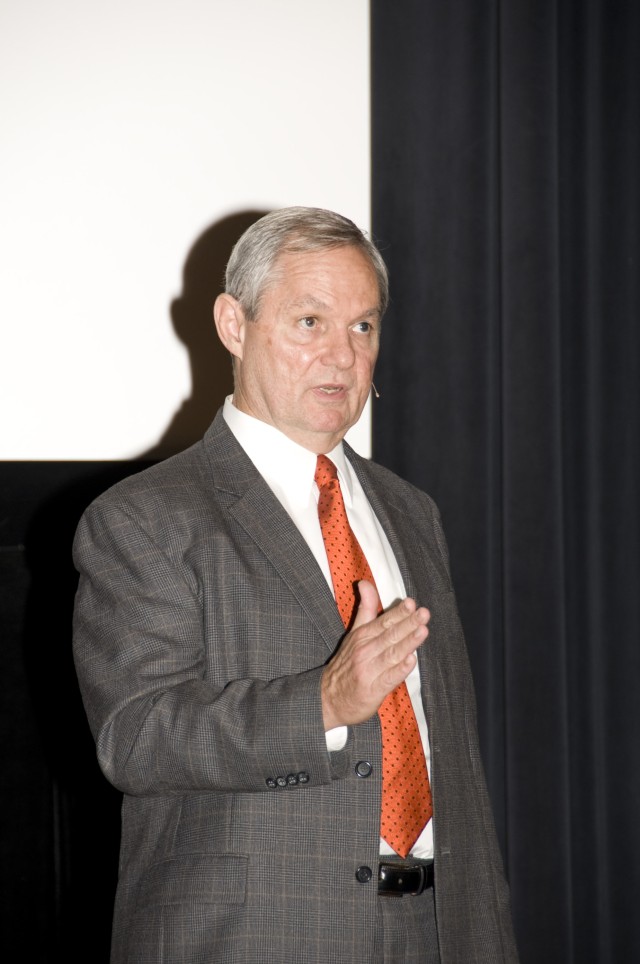Opening global financial, energy and environmental systems to new, emerging countries is key to a secure global future according to Amb. Bob Hutchings, Diplomat-in-Residence at the Woodrow Wilson School of Public and International Affairs at Princeton University, Oct. 20 here.
"He is one of the foremost authors on the emerging global security environment," said student Lt. Col. David Isaacson. "He has a clear understanding of what the future may hold,"
"Global challenges will be no solved in isolation," said Hutchings. "The U.S. and Europe need to open the global systems to accommodate rising powers while preserving the fundamental values underlying it."
Organizations like the G-7, International Monetary Fund and others should look to open their ranks to nations like China and India, whose roles in the international community are expected to expand in the coming decade, he said.
"The impact of China and India are felt everywhere," he said. "We need to improve our global relationships with these nations and bring them into the dialogue."
As nations grow and globalization takes hold, gaps between the "haves" and "have-not" creates the opportunity for trouble, Hutchings said.
"Losers from globalization could turn to radical populists," he said. "These are safe havens for terrorism."
Recent economic concerns shine the light on the interconnected nature of the world's financial system.
"The recent financial crisis dramatizes how mutually dependent and vulnerable the global economy is," he said. "That means the solutions have to be global."
Hutchings addressed the students and faculty as part of the National Security Policy and Strategy program. He spoke the potentials issues of energy, environmental security, the impact of emerging international powers like China and India, and challenges to the Western-led global order.
National Security Policy and Strategy
Hutchings served as the opening salvo for the next USAWC course that explores National Security Policy and Strategy. The students will examine all the elements that underpin national security policy and strategy, the global strategic environment, national security policy and strategy formulation, the instruments of national power and the processes employed by the United States Government to integrate and synchronize those instruments in the pursuit of national security objectives.
Throughout the course, faculty will challenge students to appraise complex national security issues that are often characterized by ambiguity and uncertainty using critical, creative, ethical and systemic thought processes as well as historical/contextual reflection and analysis. The outcome will be a better understanding of how global issues may affect U.S. policy and strategy.
Hutchings' background
A graduate of the U.S. Naval Academy, he holds an M.A. from the College of William and Mary and a Ph.D. from the University of Virginia. Immediately before joining the Woodrow Wilson School, Hutchings spent four years at the Woodrow Wilson International Center for Scholars as a fellow and as a visiting scholar. During his year as a Woodrow Wilson Fellow at the Center, he researched and wrote American Diplomacy and the End of the Cold War: An Insider's Account of U.S. Policy in Europe , 1989-92 (Johns Hopkins University Press 1997).
Before joining the Wilson Center in 1993, Hutchings was a key participant in the creation of the strategies that led to the end of the Cold War. As a special adviser to the secretary of state, with the rank of ambassador, his responsibilities included directing a $1 billion U.S. assistance program for Eastern Europe, coordinating the activities of 18 government agencies throughout 13 countries, and serving as the principal U.S. negotiator with foreign governments on assistance issues.
From 1989 to 1992, Hutchings served as the National Security Council's director for European affairs. In that post, he wrote key presidential addresses, drafted and negotiated international agreements, and developed and implemented U.S. policy in Europe during and after the East European revolutions of 1989 and the unification of Germany.
Hutchings is the author of Soviet-East European Relations: Consolidation and Conflict (Madison: University of Wisconsin Press 1983; revised 1987) and has written numerous articles and book chapters.


Social Sharing